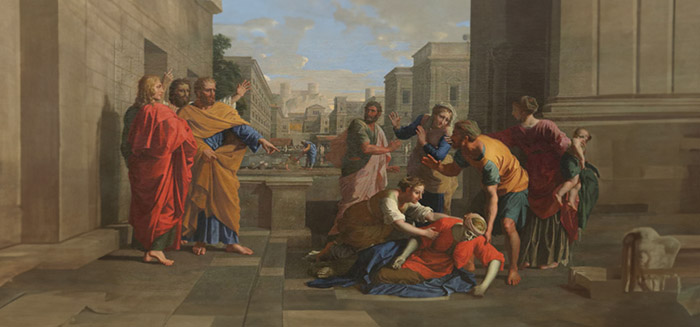Acts 5:1
But a certain man named Ananias, with Sapphira his wife, sold a possession...
Many are the strange ideas that have been expressed about this incident. Some think that this couple was wrong in not giving their all for the poor. Some think that they lost their salvation. Some think this was a part of an experiment in communism. And we could go on ad infinitum.
This sharing of goods among these early believers was not any experiment in communism. There was no compulsion to do so, as Peter said in Acts 5:4. The very essence of communism is compulsion.
There is no doubt about these folks being believers and numbered among those who were saved.
They did not have to sell their property. They did not have to give any of the proceeds away or all of them. As a part of the Christian community, they had a right to possessions and to do as they pleased with those possessions. And they could do as they pleased with the money when they sold what they had. This is all made plain by Peter (Acts 5:3-4).
Then what was wrong? Why did they die?
They died because they were Jews and still subject to the law of Moses. The law that governed the sale of land is found in Leviticus 25. The voluntary act of Barnabas in selling his acquired land and placing the proceeds at the apostles' feet is in direct contrast with the action of Ananias. He, too, sold a possession; he, too, laid the proceeds at the apostles' feet, but with the difference that he kept back part of the price while pretending that he had given all. The apostle Peter makes it quite clear that there was no compulsion to sell the land when he says, "...while it remained, was it not thine own, and after it was sold, was it not in thine own power?" Ananias sinned in that he lied to The Holy Spirit. The sin of Ananias was the sin of Achan. The reader will find that the very words used of Achan in Joshua 7:1 are used of Ananias. The LXX reads enosphisanto apo you anathematos, appropriated for themselves a part of that which was devoted. Acts 5:2-3 twice applies this particular expression to Ananias and Sapphira: kai enosphisato apo tes times, `and kept back part of the price.
If they had been Gentiles, this would not have happened. Even Gentiles, who were believers at that time, were not subject to the law of Moses. At no time have Gentiles been subject to the law of Moses. That is one of the many reasons that Col. 2:16 is Truth for us.
Can you find any reference anywhere in The Word where it says that one who broke the law lost his salvation? The fact that a man was punished, even by death, did not indicate that he was an unbeliever. In Numbers 15:33-36 they found a man gathering sticks on the Sabbath. He was stoned. Does that mean that he was unsaved? David was punished severely for his sin. Was he also unsaved? How about the sons of Aaron who brought strange fire into the Tabernacle? How about Uzzah putting out his hand to steady the ark? How about the millions of Jews who perished in the wilderness and did not get to enter the promised land? And if they were not saved, then Moses was not saved either, for he suffered the same penalty.
A lot of zealous folks are all too ready to consign any and all who make a misstep into some heathen torture chambers to suffer forever. It is well to search the Scriptures and use a little pinch of common sense. In searching the Scriptures, you might be much surprised to find that more believers are punished than others.
There is a Dispensational lesson to be learned here, too. If the church began at Pentecost, as so many teach, then why do not church members and preachers die when they lie today? Just why are you still permitted to live? And what about me?
In Acts chapter 5, The Kingdom was being proclaimed, and it was at hand. No Gentiles belonged to the group of Christian believers yet. The law was still in effect, and so the penalty fell.
In the Dispensation of The Mystery, God is dealing with believers in Grace, not law. But in every Dispensation, there is an accounting at some time.

